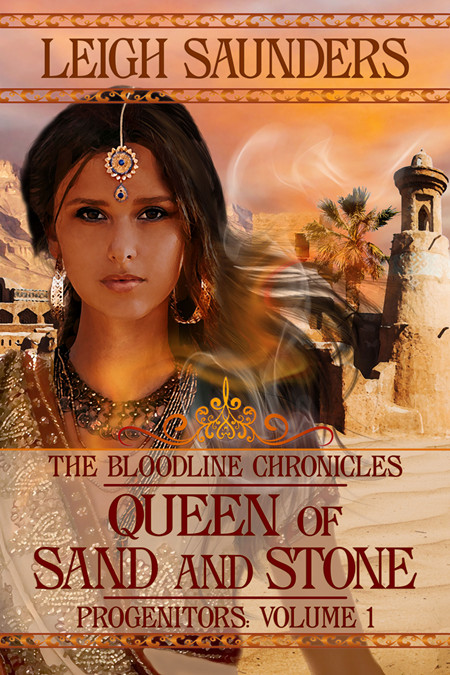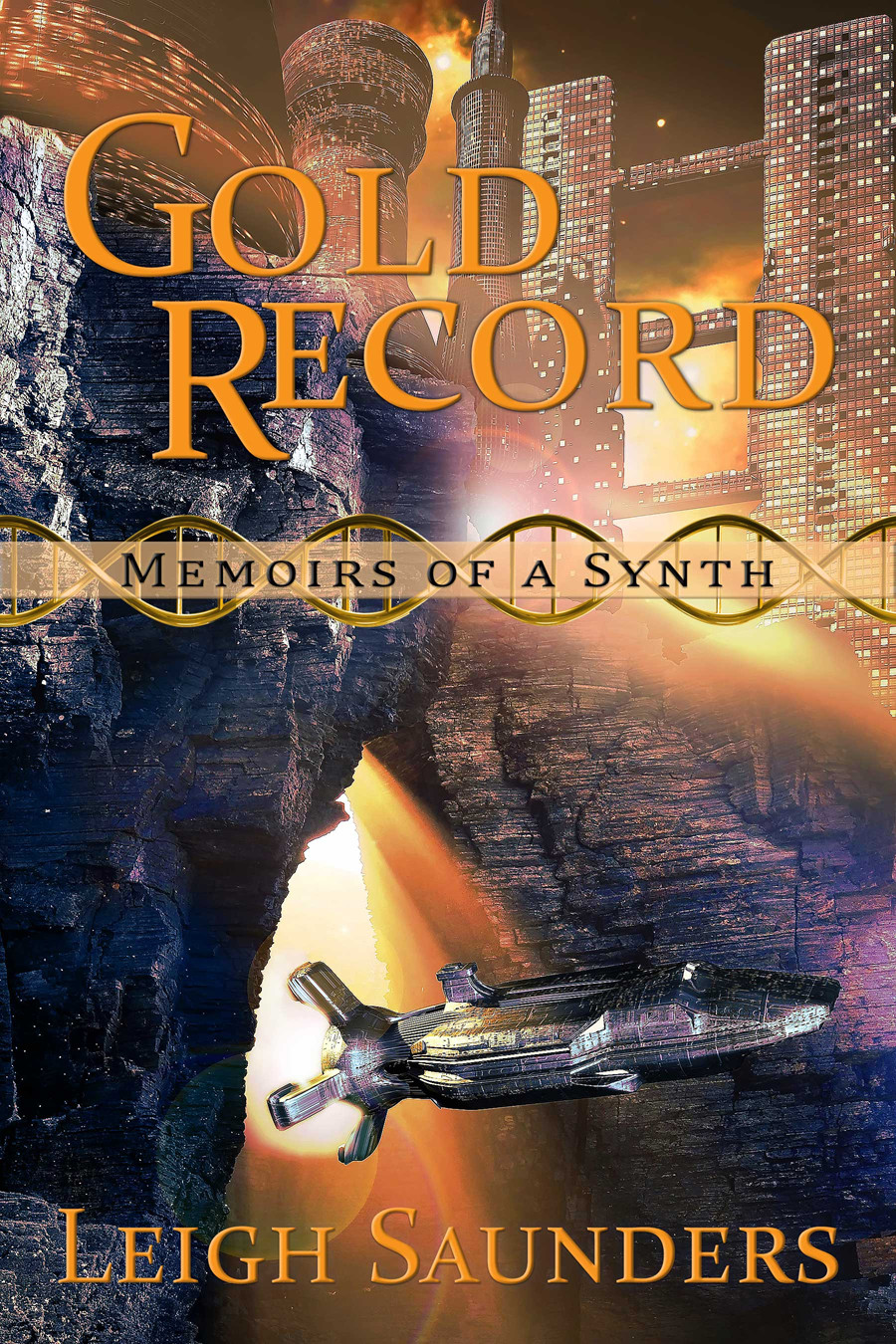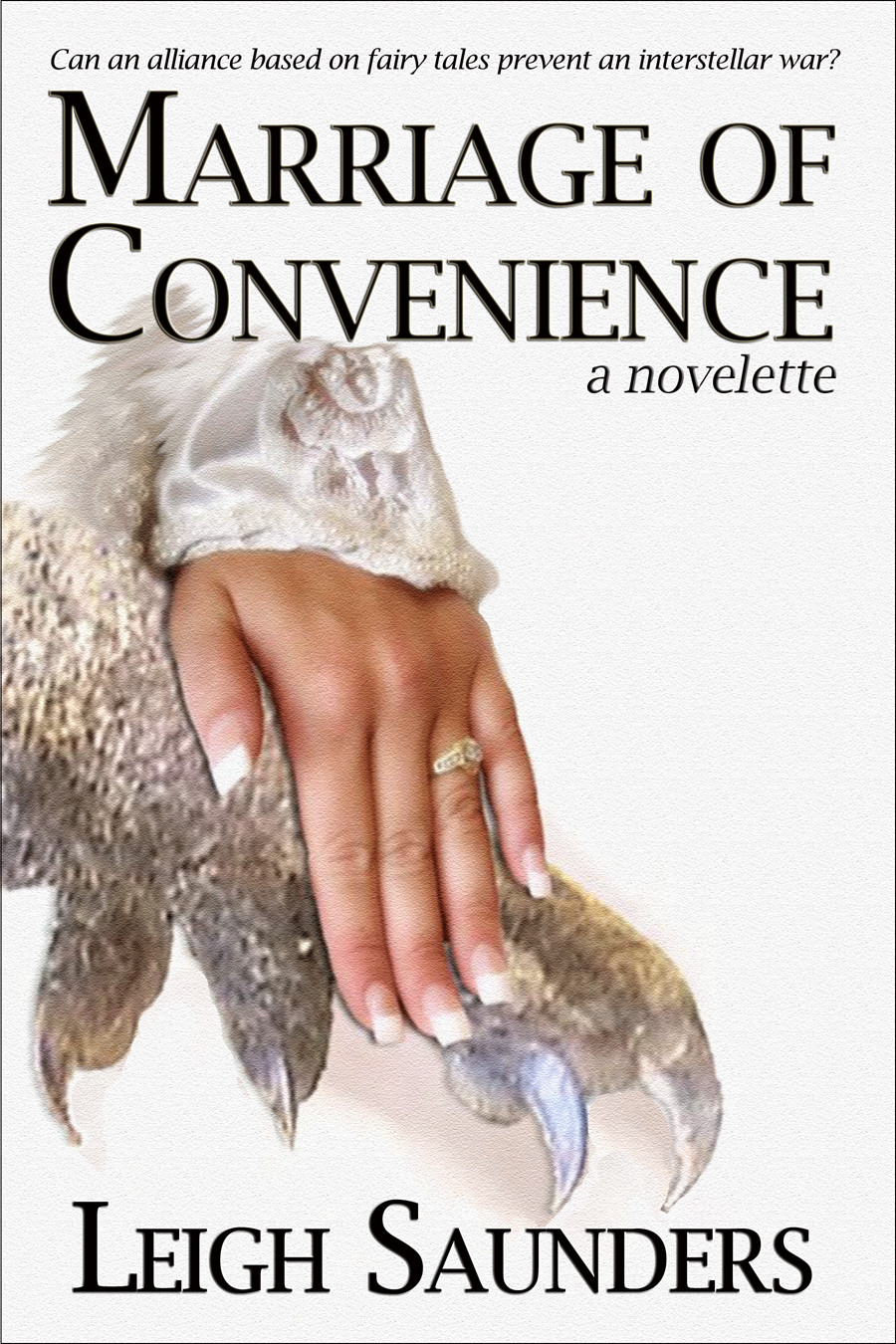Archive for the ‘Story-behind-the-Story’ Category
Write the next line…
June 2, 2014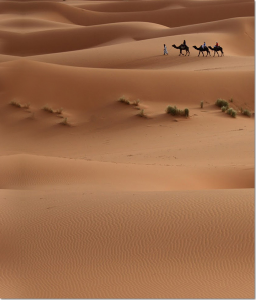 One of my writing mentors often says that the way to get past writer’s block, is just to write the next line, even if you don’t know where it will take you. I often think of it as just taking the next step while staring out across the trackless desert sands from atop a camel’s back, but that’s just the image I’ve created for myself.
One of my writing mentors often says that the way to get past writer’s block, is just to write the next line, even if you don’t know where it will take you. I often think of it as just taking the next step while staring out across the trackless desert sands from atop a camel’s back, but that’s just the image I’ve created for myself.
When I wrote Memoirs of a Synth: Gold Record, the first 20K words and basic story arc leapt onto the page in two sittings. Then I putzed and frittered my way around through the next 15K words, kicking through the rocks and weeds at the edge of the desert for a v-e-r-y long time, staring out across the empty sands and letting them intimidate me. I had no idea where the story was going, other than one or two of the scenes that ended up near the end of the book. But how to get there…???
And then I tried just writing the next line. It sucked, and I later went back and changed it, but at the moment when I took that first hesitant step into the desert of the blank page, it didn’t feel so bad. So I took another step, and then another, and the story started telling itself again.
“Writing the next line” became “writing the next scene.”
“Writing one page a day” became days where I’d look up and realize I’d written entire chapters.
Yes, there were days during that journey across the desert of the book that I hesitated, looked back at the single line of footprints stretching behind me into the distance and forward at the drifts and dunes and blowing sand ahead and wondered where the story was taking me – and I left Brianna stranded in an avalanche or floating through space in a cargo ship full of screaming herdbeasts or lounging around in her mentor’s safe-house while I wrestled my doubts back into submission – and then I took the next step, wrote the next line, the next scene, the next chapter.
And six months after I wandered into the wilderness, I found my way out of it. The book was finished – another 105K words added to the 35K I’d started with, with twists and turns and situations and characters I’d never imagined.
Because I set the goal of “write the next line.”
M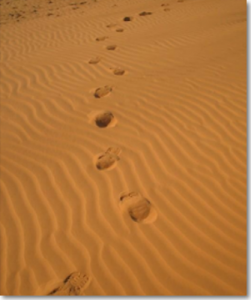 y goal is more lofty now – it’s “one page a day” – and some days it’s difficult to find the time to write that single page. But if I meet that goal, I’ll have a book finished in a year, which isn’t too shabby when it comes to squeezing in writing time around the demands of a job and a life – demands I’ve let get the better of me in the last year or so.
y goal is more lofty now – it’s “one page a day” – and some days it’s difficult to find the time to write that single page. But if I meet that goal, I’ll have a book finished in a year, which isn’t too shabby when it comes to squeezing in writing time around the demands of a job and a life – demands I’ve let get the better of me in the last year or so.
Write the next line.
Write the next scene.
Write one page a day.
Odds are, meeting easily achievable goals like these just won’t be enough, and you’ll find yourself writing two lines, or three, or finishing a chapter instead of just a scene. Because storytelling is addictive, and once you let a story take root in your mind, it will keep dragging you back to the chair until it’s finished with you.
And, odds are, by the time the book is finished, you’ll look up to discover that other stories have taken root in the fertile ground of your imagination and are just waiting for their turn to take control of your fingers at the keyboard……….
Write on!
L
p.s. In case you were wondering, this little essay is just over 600 words long, slightly over two pages in manuscript format. It took me 25 minutes to write. And there’s still 23 hours and 35 minutes left of my day, some of which is unscheduled…
—–
p.s. 2 The article (below) is what got me thinking about this whole idea again today. It’s from a business perspective, not writing-focused at all, but applies to pretty much any type of goal you may find yourself struggling with.
Why You Should Set Goals So Simple They’re Laughable
Laura Montini | Inc. | Apr 15, 2014
http://www.inc.com/laura-montini/why-you-should-set-goals-so-simple-that-they-re-laughable.html
…pledging to do something manageable is counterintuitive to most high-achievers. Instead, individuals are more likely to set [less-manageable] goals. “We create a situation somehow where A) failure is likely and B) failure is terribly, terribly devastating,” Forte said. But there’s an easy solution. In fact, it’s ridiculously easy…
Memory at Lascaux
March 30, 2013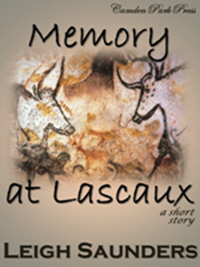 I attended a writing workshop not long ago where thirty writers crowded around large tables listening to four professional editors comment on short stories we had written for them. On some stories the editors agreed, on others they disagreed. It was entertaining, enlightening, and educational. And a whole lot of fun.
I attended a writing workshop not long ago where thirty writers crowded around large tables listening to four professional editors comment on short stories we had written for them. On some stories the editors agreed, on others they disagreed. It was entertaining, enlightening, and educational. And a whole lot of fun.
For one of the stories, we’d been given the following assignment: “…One of the greatest attributes of mankind is our ability to fight for survival, even when the struggle to continue seems hopeless. [Your assignment] is to write stories detailing humanity’s struggle after a planetary disaster…”
Coincidentally, the same day I received the assignment, I also received a copy of BBC Knowledge magazine – and not just any copy. I got the “Days that Changed the World” copy.
As you might expect, the assignment and the articles in the magazine collided in my brain, tumbled around, and, after a little bit of research and fact-checking, the ideas spilled out onto the page to create a story based loosely on events in our own planetary history. Here’s how I describe the story:
With the world covered in ash and clouded in despair, there are only two choices: lie down in the ash, or find a way to survive.
While I usually write stories that are clearly science fiction, I think I might have accidentally committed literature with this one. You’ll have to tell me!
Available on Kindle, Nook, and Smashwords. $0.99
The story-behind-the-story: Rumors of My Death
January 31, 2013A long time ago, in a far-away land…
Oops, wrong backstory there. Let’s try this again.
Immediately out of high school (that’s where the long ago and far away fits in), my older brother went into the Marine Corps. As a result, when he got out of the Marines and went to college, he was a semester behind his pesky little sister – you guessed it, me. That really aggravated him, but his aggravation has little to do with the writing of “Rumors of My Death.”
 However, my brother had a roommate, who had been blessed with the theoretically gender-neutral name “Kim” (I say “theoretically gender-neutral” with many apologies to everyone who has been given a gender-neutral name and experienced the startled reaction of someone who assumed, from hearing your name, that you were of the opposite gender. I run into this on a regular basis myself. Sigh.)
However, my brother had a roommate, who had been blessed with the theoretically gender-neutral name “Kim” (I say “theoretically gender-neutral” with many apologies to everyone who has been given a gender-neutral name and experienced the startled reaction of someone who assumed, from hearing your name, that you were of the opposite gender. I run into this on a regular basis myself. Sigh.)
Anyway, the idea of playing with a gender-neutral name in a story wandered around in my head for some time before finally bumping into a character (a newspaper columnist) in a setting (Salt Lake City) with a problem (an accident on the Bonneville Salt Flats) that seemed to suit it. “Rumors” was the result. And while I could have gone very dark with the fictional Kim Taylor’s situation, I chose to keep it lighthearted. Sarcastic even.
In fact, I can almost hear my brother’s voice narrating it in my head.
Whoever’s voice you hear, I hope you enjoy the read!
“Rumors of My Death” is a short story, available on Kindle, Nook, and Smashwords. $.99Ghost Writer #10 in Italy!
May 21, 2012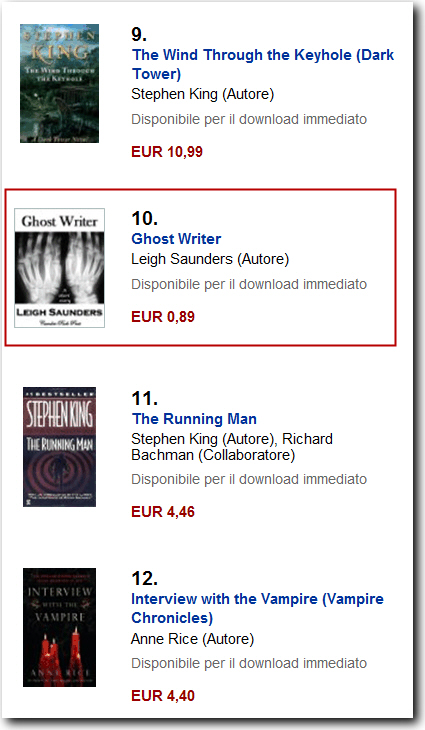 Ghost Writer is one of my favorite short stories – and, at the moment, has actually found its way to #10 on the Amazon Kindle Horror list in Italy, rubbing elbows with Stephen King and Anne Rice. I’m thrilled and honored!
Ghost Writer is one of my favorite short stories – and, at the moment, has actually found its way to #10 on the Amazon Kindle Horror list in Italy, rubbing elbows with Stephen King and Anne Rice. I’m thrilled and honored!
I don’t often write stories about other writers, but when a writer-friend of mine developed the unsettling habit of dropping out of sight for unspecified stretches of time, looking for a little peace and quiet while working on her next story, my imagination went into overtime. Fortunately (for her), my imagined scenario hasn’t caught up with her in real life… Yet.
Ghost Writer
a short story
Thomas Browne is a writer with a problem – not writer’s block, that would be easy.
In fact, if he could just stop writing, it might save his life…
Available on Kindle, Nook, and Smashwords. $0.99
The One That Got Away
February 21, 2012 I must admit, I’ve never done research for a story in quite the same way as I did for this one – actually sitting down to dinner and taking notes of the flavors as I went along! But it was worth it – or at least Nereus, the sea-god who is the central figure in this story seems to think so!
I must admit, I’ve never done research for a story in quite the same way as I did for this one – actually sitting down to dinner and taking notes of the flavors as I went along! But it was worth it – or at least Nereus, the sea-god who is the central figure in this story seems to think so!
The One That Got Away
a short story
The search for an exiled sea goddess leads Nereus, Warden of the Outcasts, to a small restaurant in the Pacific Northwest, and a broken fishing float.
Available on Kindle, Nook, and Smashwords. $0.99
Expect the unexpected…
April 9, 2011I was very happy a few days ago when I read the NASA report that the Voyager spacecraft are at the edge of the solar system, and about to enter interstellar space.
Why?
Because I remember when they took off – I was in high school, and wrote a report for my English class. My report would have been much better if I’d had access to resources like the Jet Propulsion Laboratory’s Voyager mission page; I had to rely on newspaper reports and what I could glean from faithfully watching NOVA on telelvision, hosted by Carl Sagan.
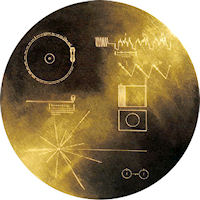 Of course, now reports of the Voyager missions make me happy for another reason. I’m a science fiction writer. And what’s cooler than to incorporate something real into a science fiction story? Well, that’s exactly what I’ve done – and it’s been a blast. (And no, I’m not taunting you – the novel, Synth: Gold Record, will be coming out soon, so check back for the announcement!)
Of course, now reports of the Voyager missions make me happy for another reason. I’m a science fiction writer. And what’s cooler than to incorporate something real into a science fiction story? Well, that’s exactly what I’ve done – and it’s been a blast. (And no, I’m not taunting you – the novel, Synth: Gold Record, will be coming out soon, so check back for the announcement!)
In the meantime, I loved the closing passage from the NASA report so much that I wanted to repost it here (but really, click on the links above and read the whole report for yourself – it’s “way cool!” as we used to say in the seventies):
“A billion years from now, when everything on Earth we’ve ever made has crumbled into dust, when the continents have changed beyond recognition and our species is unimaginably altered or extinct, the Voyager record will speak for us,” wrote Carl Sagan and Ann Druyan in an introduction to a CD version of the record.
Some people note that the chance of aliens finding the Golden Record is fantastically remote. The Voyager probes won’t come within a few light years of another star for some 40,000 years. What are the odds of making contact under such circumstances?
On the other hand, what are the odds of a race of primates evolving to sentience, developing spaceflight, and sending the sound of barking dogs into the cosmos?
Expect the unexpected, indeed.
